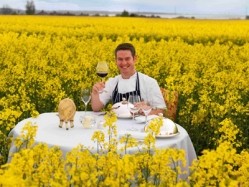Lincolnshire chef unveils sustainable restaurant plans

Colin McGurran, chef-owner of Winteringham Fields in Winteringham, near Scunthorpe, began planting seeds for vegetables and keeping livestock on eight acres of farmland behind his 40-cover restaurant with rooms 18 months ago.
Now the chef, who oversees a team of eight chefs, has such an abundance of produce, he only uses ingredients on his menu sourced from his own farm, or from within a two mile radius of it.
"Everything on the menu is grown by us. The only thing we can't say is ours is beef, because it's not economically viable for us to keep cows," he said.
Sustainable and ethical
McGurran's chefs not only prepare and cook food, they are also involved in every aspect of growing the produce and caring for the livestock, which includes lambs, pigs and chickens.
He said: "We do all the work. We spend at least an hour a day weeding the vegetables and checking the animals. We try to give the animals the best kind of life and I'm sure the produce tastes better because of it. It also gives the chefs a new level of respect for the produce. When they’ve seen a lamb born, bottle-fed it, seen it grow then sent it off to slaughter they give extra care when they are cooking it."
Front-of-house staff also take a keen interest in the menu's ingredients: "They take great delight in telling customers that the tomatoes, or the sprig of parsley on their plate has been grown just a few feet away," said McGurran.
Waste and energy efficiency
Because Winteringham Fields' team has such involvement in the produce used, McGurran said his chefs try and use every part of an animal or vegetable. Any leftover food and unused fruit and vegetables are used as pig feed.
The gas kitchens will also be re-fitted with electric appliances next year in a bid to reduce energy output and help save money.
"A lot of it is driven by finance," said McGurran of his efforts to run a sustainable restaurant. "I've paid out for seeds this year, but next year my vegetable costs will be nothing. When you think that most restaurants will pay about £8 for a large punnet of vegetables, that's a big hit to your GP. We are also producing animals far cheaper than we can buy meat for."
He added: "Once you have sowed the seeds it's relatively easy and you actually don't need that much space. I'm learning as I go, but the more this happens, the more I'm getting interested in it."
Sustainable restaurant reviews
McGurran's accomplishment coincides with the news that Times restaurant critic Giles Coren is to include a sustainability rating alongside ratings for food, wine and service in his restaurant reviews.
Restaurants where Coren has dined at will be contacted by the SRA and asked to answer a 70 question survey on sustainability to determine their rating out of 10.
It is the first time a national newspaper has been involved with the SRA at this level. SRA managing director Mark Linehan hopes it will lead to more restaurants operating sustainably and being recognised for it.
"Restaurants deserve recognition for their good practice and diners want to be able eat out without worrying about where the chicken on the menu was sourced or how much the kitchen porter is paid," he said.

































